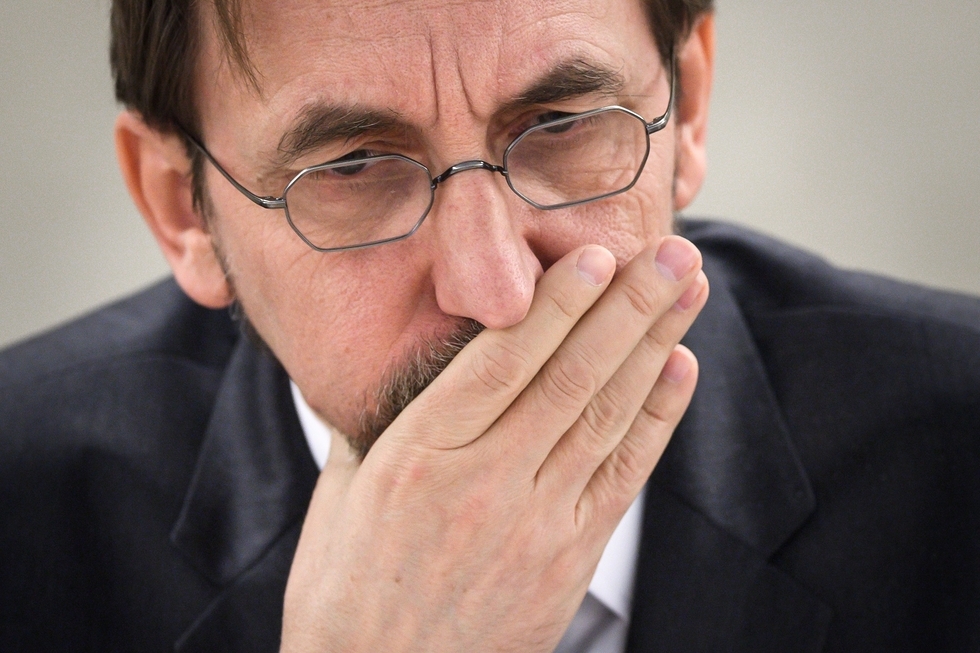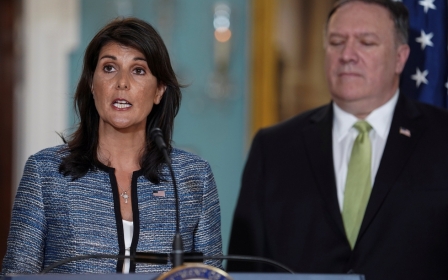UN human rights chief to leave post with principles intact but few friends

NEW YORK, United States – Jordanian prince and UN Human Rights Commissioner, Zeid Ra'ad al-Hussein, will leave his United Nations post later this month under a cloud, having broken from diplomatic niceties by shaming great powers and uncomfortably turning the tables on Western governments and the allies to whom they sell weapons.
He has warned of "xenophobes, populists and racists" winning votes and imperilling Western democracy. US President Donald Trump's immigration blitz is "state-sponsored child abuse," and Rodrigo Duterte, leader of the Philippines, "needs a psychiatrist," Zeid has said.
By last December, it was clear that UN hegemons – the US, Britain, France, Russia and China – were fed up with Zeid. Instead of pulling his punches and "bending a knee in supplication," he decided to step down at the end of August.
While his run-ins with big powers are well documented, less is known of Zeid's scrapes with his homeland, Jordan, where his censure of regional heavyweight Saudi Arabia's war in Yemen have rendered the gaunt 54-year-old persona non grata.
It has been a spectacular fall from grace for a Hashemite prince who was Amman's envoy to Washington and to the UN before becoming rights commissioner, the highest-ranked Arab in the UN system since Egyptian Boutros Boutros-Ghali led the world body in the 1990s.
"Jordan is a country I was born in and grew up in, I served and I love. But when it came to this job, it was just like any other country to me and I wasn't going to grant it any special favour," Zeid said in answer to a question from Middle East Eye.
He came good on those words in December 2014, when he called Jordan's revival of executions "disappointing". In March 2017, he bashed Amman for hosting Omar al-Bashir at an Arab League confab despite the Sudanese president's war crimes charges.
He was even tougher on the Saudi-led coalition fighting in Yemen, of which Jordan is a member. In March 2016, he said civilians died from air strikes with "unacceptable regularity" and alluded to "international crimes by members of the coalition".
He became one of the few voices on the world stage to call for a UN-backed probe into atrocities in Yemen, putting him squarely at odds with Riyadh and its diplomatic backers in the US and Britain.
For this effort, Jordan's foreign minister, Nasser Judeh, chided him. It was Cairo, however, that issued the harshest Arab rebuke of Zeid after he described a "pervasive climate of intimidation" in the run-up to Egypt's presidential ballot in March.
President Abdel Fattah el-Sisi's government did not mince its words. Foreign ministry officials told Zeid to "to stop attacking the Egyptian state without any right, and to instead adopt a professional and objective approach" to his work.
These were salty comments for a region known for sugar-coated diplomacy and a mark of how Arab leaders felt betrayed by Zeid. Rows between Arab statesmen take place behind closed doors; seldom are rebukes emailed as news releases to thousands of journalists.
"Maybe I have been critical of Jordan's friends and Jordan itself," Zeid told MEE and other reporters at the UN headquarters in New York this week.
"It's quite a frosty relationship."
Zeid told MEE that the fractious relationships he had with countries, including Jordan, had exhausted him.
He describes "feeling very low," jet-lagged and "fragile" in non-descript hotel rooms in far-flung cities on foreign trips.
"I realised this job, the pressures, are enormous," Zeid said.
Jeremie Smith, a Geneva-based director for the Cairo Institute for Human Rights Studies, a pro-democracy outfit, said Zeid is seen as a "traitor" in Riyadh, Cairo and other Arab capitals. He embarrassed Jordan and eroded its status as the region's "political bridge builder".
Zeid's censure of Israeli settlement-building and the Islamic State's "mean-spirited house of blood" played well from Casablanca to Muscat, but his critiques within the fraternity of Arab League members were seen as beyond the pale.
"He would have been offered senior appointments by powerful Middle Eastern countries and perhaps even been nominated for the UN secretary general's position in the future," Smith told MEE. "He gave that up by taking a principled stance."
Zeid hails from Arab royalty, served in Jordan's desert police and was a rising star of its diplomatic corps, but the British-educated son of a Swedish mother was never fully at home in the back-slapping world of Middle Eastern deal-making.
Balkan atrocities
Bucking that trend, he worked for the UN amid the Balkan atrocities of the 1990s and was instrumental in setting up the International Criminal Court. He frequently warns of Holocaust-style abuses in the modern era and has helped the Auschwitz Institute for Peace and Reconciliation.
This makes him an awkward target for critics – and he knows it. In a landmark speech in September 2016, Zeid admitted he had become a "nightmare" who dared criticise the governments that elected him.
"I am a Muslim, who is, confusingly to racists, also white-skinned," he said.
Though Zeid could not be silenced by the mighty, he is doubtless being sidelined. The father-of-three is cheered by activists in Geneva and New York as a rare example of an idealist in office. Some, however, question whether he should have kept his powder a bit drier.
For Sarah Leah Whitson, a Middle East expert for Human Rights Watch, an advocacy group, he was willing to shine the spotlight on all dodgy governments and did not exempt "those favoured by the United States". Zeid did his job, she said, the failure was in the UN's creaky systems.
"Nobody wants to be criticised by a body it is technically paying for," Whitson told MEE.
UN Secretary-General Antonio Guterres formally posted the job vacancy to replace Zeid in June and reportedly began interviews in July. Former Chilean president Michelle Bachelet was approached, but she turned the job down initially, according to reports.
One of those vying for the job, Nils Melzer, a UN torture expert, has distanced himself from Zeid. The Swiss national said that "antagonising" world leaders does not work and warned of a "global shipwreck" from too much naming and shaming.
But, as he prepares to tidy his desk, Zeid says that he had played it right: holding all countries to the same standard and using the office as a bully pulpit for leaders who do not listen or do not meet their private pledges.
Importantly, he says that method is hard-wired into the system now. Future commissioners will struggle to ignore reports of illegal detentions and crackdowns on peaceful protesters. Excuses will be given behind closed doors, but the news releases will be sent out anyway.
"There's not that much room for manoeuvre," Zeid said. "Silence does not buy you respect."
Still, Zeid frequently likens the era of Trump and the global migrant crisis to the rise of European fascism in the 1930s. If he is right, perhaps his hope that a successor will keep the UN's torch of human rights burning is only that: a flickering hope.
This article is available in French on Middle East Eye French edition.
New MEE newsletter: Jerusalem Dispatch
Sign up to get the latest insights and analysis on Israel-Palestine, alongside Turkey Unpacked and other MEE newsletters
Middle East Eye delivers independent and unrivalled coverage and analysis of the Middle East, North Africa and beyond. To learn more about republishing this content and the associated fees, please fill out this form. More about MEE can be found here.




